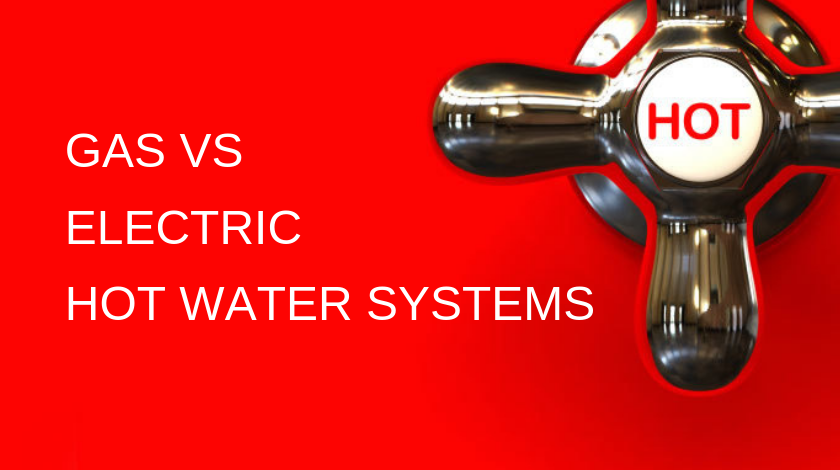One of the trickiest decisions homeowners are faced with is choosing between a gas or electric hot water systems. It is even more complicated, with the availability of both in different models and styles, such as Dux, Rinnai, Rheem. However, considering how important hot water is to the everyday living of each family, a choice must be made.
In this piece, we will be discussing a couple of points that can help in making the right decision when it comes to choosing between a gas and electric hot water systems.
1. The number of people living in the house
The size of the family will determine the amount of water used during the day. For a large-sized population, a bigger system will be ideal. The other question is, what is the water used for primarily? For instance, most commercial properties use hot water for cooking and cleaning, unlike private residential properties that use hot water for bathing.
2. How spacious is the property?
Hot water systems usually require a decent amount of space to work effectively, especially with the need to make new accessible pipework. Hence, the size of the available space for the hot water system is important. While it is possible to have certain hot water systems only outside the home, others can function excellently irrespective of where they are installed. To find out what works best for your property, bring in a plumber to conduct a thorough inspection.
3. What are the available energy sources?
Did you arrive at this post because you need to replace your hot water system? Choosing the same type of unit you have now will save on installation costs, since switching from electric to gas requires running new gas lines by a licenced gas fitter (not all plumbers have a gas licence!). There are cases where you might not have a gas supply and need an electric hot water system.
4. Which offers higher energy efficiency?
You can save money and keep the environment safe by installing an energy-efficient system. The gas options are generally more energy-efficient. The energy star rating will give you an idea of the system’s efficiency.
5. What type of hot water service do you want?
You can either opt for a continuous/ instantaneous flow or storage tank hot water service. The former will only provide hot water when needed, while the latter prepares and keeps the hot water until you need it.
6. How much are you willing to spend?
Hot water systems require different installation processes. Hence, it is important to consider the present running costs and the cost for the first initial installation of the system. Once you know the total cost, you can tailor your decision to suit your budget, especially the initial costs and the duration of usage. You should also factor in the frequency, as well as the costs of maintenance and repairs.
Gas or Electric Hot Water Systems: Which should you choose?
While the points listed above will guide you in choosing the right hot water system for your home, the safest and easiest option is to involve a licensed local plumber. Such a professional can conveniently and correctly answer all your questions about costs, installations, and other aspects of hot water systems. In the end, you can quickly determine which is better for your home – gas or electric.
To get you started, we have highlighted the main differences between the gas and electric hot water systems below.
Gas Hot Water System
Let’s start with the fact that gas hot water systems work faster and pose less threat to the environment. This is because gas emissions aren’t as potent as the emissions from an electric hot water system. Gas is the more preferred energy source in most homes because of its high energy efficiency. However, the need for adequate ventilation means they are always installed outdoors.
Gas hot water systems come in three forms. The first type is a solar water heater with instantaneous gas boosting. It comprises a solar hot water system powered by gas, which serves as a backup source of heat. The second is the storage option, which keeps the heated water in an insulation tank until it is needed. The third is the instantaneous or continuous flow option, where the hot water is prepared and delivered when required. It doesn’t include a storage tank.
Electric Hot Water System
Homes that rely on electricity as the source of power is better off with an electric hot water system. It is also the better option for larger homes with more residents, due to their bigger capacity and size. Another advantage of an electric hot water system is that you can choose to install it either indoor or outdoor. It comes in two types; the instantaneous type and the storage tank type. Both options are different in their functions, and your choice will depend mainly on the size of your home and how much hot water you require.
The Verdict: Gas or Electric?
It is highly recommended that you invite a fully-licensed and experienced plumber or plumbing company when it comes to deciding between an electric or a gas hot water system. The best hot water plumbers will offer professional advice about the right hot water system for your home. Thus, they can help you to make a choice between a gas and electric hot water system, depending on your lifestyle, budget, home, and surroundings.
Looking for a competent plumber or plumbing company to install or fix your hot water system? Contact Best Plumbers Club today to have a verified and trusted expert visit your home.







